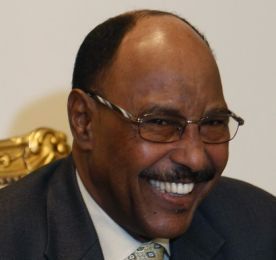Rights group calls on Chad to arrest Sudan defence minister
April 25, 2013 (NEW YORK) – Human Rights Watch (HRW) has called on the Chad government to immediately detain Sudanese defence minister Abdel-Rahim Mohammed Hussein, who is attending a conference in the country despite an arrest warrant for him by the International Criminal Court (ICC).

This is believed to be his first visit to an ICC member state since being charged by the Hague-based court in March 2012.
The minister served as Sudanese president Omer Hassan al-Bashir’s interior minister and representative for the region in 2004, during the height of the conflict.
“Chad should stand with Darfur’s victims and arrest, not welcome, Hussein,” Elise Keppler, senior international justice counsel at HRW, said in a statement on Wednesday. “He is a fugitive from justice who is sought with respect to heinous crimes committed in Darfur”, she added.
Hussein is the second most senior Sudanese official wanted by the court after Bashir who has been indicted since 2009. Khartoum refuses to recognise the court’s authority or handover any of the suspects, which also includes a governor and a militia leader.
In a filing to judges last year requesting the arrest warrant, ICC prosecutor Luis Moreno-Ocampo said Hussein is among those who “bear greatest criminal responsibility” for alleged atrocities in the war-torn region from August 2003 to March 2004.
At the time, Hussein was interior minister and the Sudan government’s special representative in Darfur.
Hussein is currently attending a two-day conference to evaluate the performance of the joint Sudanese-Chadian border, which is being held in the capital N’Djamena and is due to conclude on Friday.
Sudan and Chad have deployed the Border-Control Force (BCF) along their common borders with the aim of curbing cross-border infiltration into each other’s territories.
Chad is the only ICC nation that has repeatedly allowed Bashir to visit in defiance of its theoretical obligations under the Rome Statute to secure the surrender of those wanted by the court.
Chad maintains it is simply abiding by an African Union (AU) decision urging member states not to cooperate with the ICC in apprehending the Sudanese leader, though several countries did not abide by it.
However, HRW says that under international law, AU decisions cannot negate Chad’s obligations as an ICC member and nor do they apply to Sudanese suspects other than Bashir.
“Chad does not have a leg to stand on if it tries to hide behind the African Union in not arresting the defence minister. The AU has never called for Hussein to be protected from arrest,” said Keppler.
Chad recently postponed two anticipated visits by the Sudanese leader in March and April amid public outcry and diplomatic concerns related to Bashir’s presence.
Bashir had been due to attend the Great Green Wall summit in Chad earlier this month when Chadian president Idriss Deby abruptly postponed the event until June, citing the conflicting schedules of participating leaders.
It was the second time Deby had pushed back the summit, which had originally been planned for March.
The AU’s stance has also enabled Bashir to visit other African ICC signatories such as Kenya, Djibouti and Malawi without incident.
But at its January summit in Addis Ababa, the AU this time omitted the usual mention of its resolution urging its members to ignore the ICC’s warrant against Bashir.
Chad, an ICC member, has already received Bashir three times, most recently in February when it hosted a summit for the community of Sahel-Saharan States (CEN-SAD).
The country was subsequently reported to the United Nations Security Council (UNSC) for non-cooperation, along with other ICC members who received Bashir.
The UNSC, however, chose to take no action against Chad or the other nations, while the AU issued a resolution backing the decision of the countries to allow Bashir to visit.
Close to 100 human rights groups and law societies across Africa signed a letter addressed to the Chadian president, urging him to honour his country’s obligations to the ICC prior to Bashir’s last visit in February.
The European Union also expressed its concerns following the visit, although it stopped short of condemning the Chadian government outright.
During Chad’s thorny relations with Sudan, Deby at one point vowed to execute the arrest warrant against Bashir, in defiance of the AU’s stance, but later reversed his position as relations improved.
(ST)
